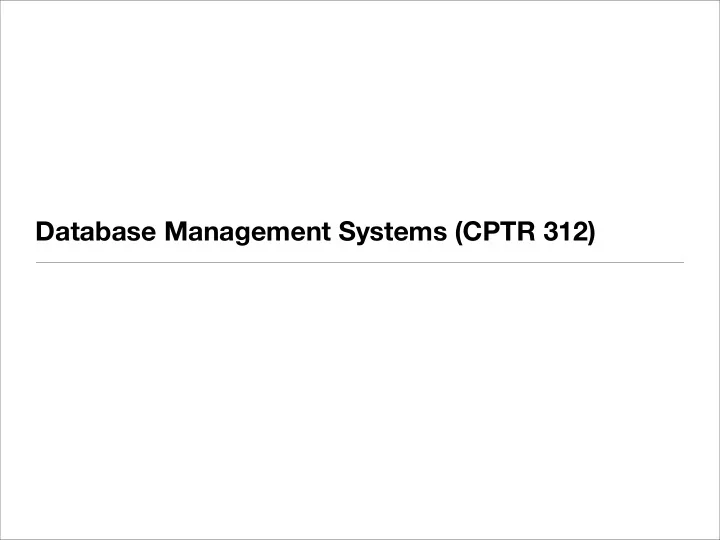

Database Management Systems (CPTR 312)
Preliminaries • Me: Raheel Ahmad • Ph.D., Southern Illinois University • M.S., University of Southern Mississippi • B.S., Zakir Hussain College, India • Contact: Science 116, rahmad@manchester.edu, 982-5314 • Tues: 9:00 am - 12:00 am, Thurs: 10:00 am - 12:00 am • Email me with subject starting with CPTR312 • http://users.manchester.edu/Facstaff/RAhmad/classes/312/index.htm • Also, Angel’s course webpage has a link to above
Preliminaries • Course • Science 142, MWThF: 9 – 9:50 am • Databases: • Crucial • Insightful • Challenging • Discuss problems early, often • Assignments, quizes, tests • Slides will be available online • Keep up to date with the deadlines and due dates
Introduction to Databases
Chapter 1: Introduction • Purpose of Database Systems • View of Data • Database Languages • Relational Databases • Database Design • Object-based and semistructured databases • Data Storage and Querying • Transaction Management • Database Architecture • Database Users and Administrators • Overall Structure • History of Database Systems
Database Management System (DBMS) • DBMS contains information for a community of users • Collection of interrelated data • Set of programs to access the data • An environment that is both convenient and efficient to use • Database Applications: • Banking: all transactions • Airlines: reservations, schedules • Universities: registration, grades • Online retailers: order tracking, customized recommendations • Manufacturing: production, inventory, orders, supply chain • Human resources: employee records, salaries, tax deductions • Databases touch all aspects of our lives; most pervasive software
History • In the early days, database applications were built directly on top of file systems • Drawbacks of using file systems to store data: • Data redundancy and inconsistency • Multiple file formats, duplication of information in different files • Difficulty in accessing data • Need to write a new program to carry out each new task • Data isolation — multiple files and formats • Integrity problems • Integrity constraints (e.g. account balance > 0) become “buried” in program code rather than being stated explicitly • Hard to add new constraints or change existing ones
Recommend
More recommend